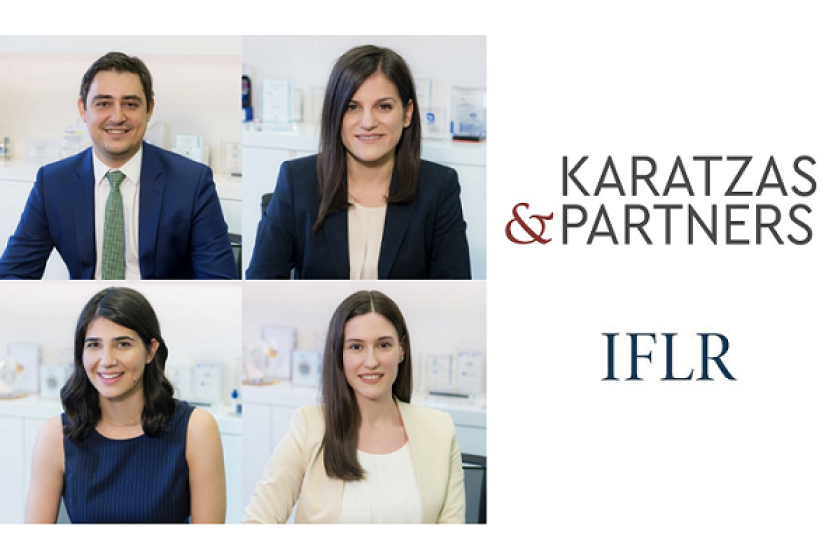Over the past two years, legal professionals have had the opportunity to re-evaluate their working models, and law firms across the globe have found themselves needing to offer new recruits much more than the traditional big salary and benefits previously offered. Changes are being driven from the ground-up, with young lawyers at the centre of driving innovation.
IFLR has teamed up with Christos Paraskevopoulos, Maria Chronaki, Georgia Vathi, and Stavroula Simitzi – up-and-coming lawyers from Karatzas & Partners in Greece – to hear about how young lawyers are leading the evolution of the legal profession.
Next Gen
What is the biggest difference between lawyers under the age of 30 and those from previous generations, including ‘early millennials’ and ‘Generation Y’?
Apart from their evident superiority in tech-savviness, millennial lawyers are often more adaptable to change and keen to innovate than ‘boomers’ and ‘Generation X’ legal professionals – and this can be stated as the biggest difference.
This comes as no surprise since millennials have set off on their careers during an era of economic instability and continual change. In addition, their inclusive mindset allows them to value diversity and be motivated by the ability to make an impact.
However, at the end of the day, millennials who have chosen to pursue a career as a corporate lawyer have more in common with their predecessors than differences. This includes in regard to the core elements of the profession – like the commitment to their work, the alignment of their personal values to those of the business and the sense of fulfilment from what they do.
How important is it that the work you do is ‘meaningful’? Would you say there has been a move away from legal careers being associated with ‘pay and prestige’?
New generation lawyers show an increasing interest and motivation to work in projects that bear a socioeconomic significance, in addition to the status that is generally associated with high profile transactions.
A classic example would be the increasing interest in projects that contribute, directly or indirectly, to the globally emerging concern for environmental sustainability, including the issuance of sustainability linked bonds and green bonds or financing of renewable energy projects.
A different angle of the same discussion would be the increasing interest in new areas of law, such as artificial intelligence (AI) or virtual currencies. The common denominator in both examples is a move towards areas of legal work that include a sense of contributing to something that is important or innovative and could help make a difference in the greater picture, or pave the way for the future of legal profession.
Remote-working has transformed the traditional notion of the ‘9-5’. Do you believe tomorrow’s leaders will want to return to the office or is a more flexible work schedule, the route for the future?
Lawyers’ work, especially in internationally-oriented working environments, is often incompatible with the traditional notion of fixed working hours. The shift to remote-working which was introduced to a larger scale mainly due to the Covid-19 pandemic, allowed for a flexibility in the working schedule that was most welcomed especially by younger generation lawyers who have adapted more easily to the new working pattern.
Although the traditional office will remain a point of reference in promoting corporate bonding and the sense of belonging to an organisation, retaining the flexibility introduced by remote-working is likely to be a key factor for new generation lawyers in the coming years, shaping the policies of law firms who wish to attract and retain them.
Globally, lawyers regularly work ‘round-the-clock’. Do you think rising calls in the industry for a better, more-manageable ‘work-life balance’ will help end this reputation for the profession?
Long working hours are often considered an as inherent component of a lawyer’s work week, particularly in law firms working on international transactions, where multi-participants, time differences and demanding timelines shape an environment substantially different than that of a traditional ‘9-5’ schedule.
The recent experience of remote-working offered a different perspective, proving that flexible working hours could be the key to achieving a better work-life balance in a profession where fixed working schedules are likely to fail. Younger generations of lawyers that gained this experience and witnessed the associated benefits are more likely to shift towards this direction, leading law firms to adopt and evolve policies that ensure flexibility and encourage lawyers to determine their own working schedule.
Describe what digital literacy – and the importance of investment in technology – means to your generation? Would it herald an improved era of productivity?
Legal services, along with the whole services sector, seems to be going through a fundamental technological transition. Tools from the previous generation like personal computers, internet and connectivity and electronic databases have substantially increased legal sector productivity, but in a manner which only enhances lawyers’ functions and does not at all substitute any part of them.
Although at its initial phase of development, artificial intelligence has the inherent capacity, especially taking into consideration the increasing availability of data and the exponential increase of computing power quantum computers have to offer, to start taking over functions which traditionally were physically undertaken by lawyers. Therefore, digital literacy – not only on operating computer systems, but extending to the fundamentals of data analysis and coding – paired with substantial investment by law firms to this regard, appears essential for lawyers to follow the transition and be able to combine traditional legal thinking with AI and harness the unthinkable per capita productivity capacity of such combination.
Karatzas & Partners is proud to be one of the most innovative law firms in Greece through investment in newtechnologies and the adaptation of market-edge organisational standards. It is the first law firm in Greece to use an ΑI platform, which is based on machine learning technology and pattern recognition and can be a useful tool within the framework of a due diligence exercise.
Moreover, the firm is the first Greek law firm certified by TUV Austria Hellas with the ISO 27001, the international standard for the security and protection of an organisation’s information.
How has technology played a role during the pandemic, in connecting and collaborating with co-workers and clients?
The pandemic era showcased a real paradox. Technologies that were already established and widely available well before the pandemic enabled the legal profession to switch almost overnight to remote-working.
Whole deals were negotiated, large sets of transaction documents were drafted, and large teams collaborated without a single physical meeting or presence at the office. This has been the case for our firm, as it developed and implemented a business continuity plan right from the beginning of the pandemic, which was submitted to a stress test and so we were prepared to offer our services remotely as soon as it was needed.
Hence the question arises, why did the sector need such a disruptive event like a global pandemic to take full advantage of tools available, which, whatever the downsides, still have the capacity to reduce costs, improve efficiency and even improve lawyers’ life quality? Hopefully, this paradox will lead to the whole sector reconsidering its openness to new forms of offering legal services and deviations from traditional norms.
To that respect, Karatzas & Partners is also adapting tο the new reality and continues to implement remote-working by further developing new technologies and by offering to its people a more flexible work schedule.
Do you think continued education, training and mentorship programmes – in a law firm environment - can help build a productive and resilient workforce?
Continuous learning is inherent in the legal profession and thus a key to success. Although it is primarily a personal endeavour of each lawyer to enrich their legal knowledge and advance their skills, customised support in the form of seminars, workshops and mentoring provided in a structured manner by the employer could only facilitate the learning process for a legal professional.
It is highly important for lawyers, especially for the young, to have mentors offering their business insight and guidance on legal matters, providing feedback on their performance and input on day-to-day work processes. This way, law firms build a trustful and aspiring environment for their employees, which feel valued and appreciated.
Such investment in lawyers’ professional development is, for a matter of fact, an investment in the law firm itself, as the firm is represented by skilled lawyers and trained according to the firm’s standards. Moreover, in such cases, associates are usually loyal to their employer, motivated and overall satisfied with their jobs.
Your generation will have the most culturally diverse set of lawyers ever. How important is it for today’s business world that law firms actively embrace inclusive?
Law firms do not have an option but to embrace cultural diversity, if they do not want to be left behind. On the one hand, economic globalisation requests for multicultural players and on the other, millennials, who are already inclusive of diversity, are gradually taking over the legal services industry.
Such a change can be beneficial for the law firms in many ways: Firstly, diverse employees coming from different backgrounds bring different perspectives which can lead to innovative solutions. Moreover, multicultural lawyers can be the point of reference for international clients whereas the understanding of local laws, native language skills and knowledge of the culture can be crucial for participating in transnational projects. Thus, globally-oriented firms instantly get a competitive advantage compared to those who are not. In addition, multicultural and inclusive law firms not only they have a broader talent pool of prospective employees, but they also get to attract talented professionals with a global mindset.
ESG concerns are increasingly brought up in the boardroom. Do you think this will gradually become a part of all corporate decision-making?
At a time that the climate crisis is quickly reaching a point of no return, social exclusion and inequality are apparently detrimental to our social and economic fabric, ESG is coming in the forefront of decision-making. Providers of banking and capital markets financing, equity investors clearly place an increasing importance on ESG, while such trend is reinforced by local and global policymaking.
The severity of the environmental and social issues will most possibly make ESG a cornerstone of corporate decision-making, leaving the era of ‘greed is good’ well behind us. Therefore, it becomes crucial for law firms to adapt, by not only applying ESG criteria to their governance, but also by fundamentally adopting ESG as of part of their culture and legal mindset in order to be in a position to best advise their corporate clients in the future.
A career in law
What key piece of advice would you give to young attorneys just getting into a firm or entry-level job? Is there something you wish you knew when you were first starting out?
Young attorneys entering the legal services industry will benefit if they are patient and conscious. Α young legal professional, who has no previous related work experience, should be mindful to observe and adjust to the firm’s culture, to realise the dynamics in the lawyer-client relationship but also in the transactions themselves, and to understand the causes behind things.
It takes some time to integrate, acquire the mindset of a corporate lawyer, and respond fully to all the challenges of the job. Knowing the above would help young people focus from the outset on what is important, and manage their expectations in terms of how fast they will climb the career ladder.
What does your firm do to nurture and promote talent? Do you think it compares well to others in your market in this area?
Our firm fosters a working environment based on meritocracy, trustful relationships and commitment, which encourages young lawyers to take initiative and pursue their personal development, while enjoying the benefits of teamwork.
Its status as a leading law firm with long-standing relationships with domestic and international clients and law firms allows our lawyers to participate, from the beginning of their career, in landmark transactions and evolve professionally, while building their personal brand name within the firm. Talent and commitment are rewarded with leading roles in transactions, outside of strict age or status criteria. Our human resources practices include regular feedback and performance evaluation on the basis of a transparent and concrete career path, individualised for each lawyer, which permits people to focus on the development of both legal and soft skills required for their professional development.
The above has enabled our firm to establish a leading position in the local market in attracting next generation lawyers, who seek a supporting environment that will invest in their progress. Moreover, our firm is nurturing a modern profile by implementing ESG policies, adopting new technology tools, supporting diversity and equality and fostering a friendly, balanced and modern safe environment for its lawyers and personnel.
What would you say are the three key objectives that firms would need to embrace to retain their best ‘next gen’ lawyers?
If it came to the three key objectives that law firms would need to pursue to retain their best ‘next gen’ lawyers, these would include the following:
Promoting a corporate culture of flexible working schedules, that takes into consideration the particularities of the legal profession, so they can offer a more realistic work-life balance perspective for their employees;
Creating a working environment that encourages initiative and allows employees to be more engaged in company affairs, including in the active management of client relationships, so that they can develop a personal brand within the company identity; and
Retaining a leading role in local market that allows them to participate in innovative transactions and stay up to date with business developments.
If you could introduce one new policy in the legal profession what would it be?
Extended working hours – apart from the well-known effects on mental health – seem to take a toll on physical health too. In a recent paper authored among others from institutions including the World Health Organization (WHO) and the International Labour Organization (ILO), it is suggested that each year, three-quarters of a million people are dying from ischaemic heart disease and stroke, due to working long hours.
Glorifying overwork to the point of a health crisis should not be tolerated especially in a profession, which prides itself on being at the forefront of social regulatory evolution. Drawing lines on that matter at a global scale, the legal profession could safeguard its sustainability and attractiveness to talent and avoid ‘regulatory arbitrage’ when overwork culture is addressed at a local or even law firm level.
The IFLR Change Makers series provides a platform for young lawyers from IFLR1000 ranked firms to share their perspective on the transformation of the legal industry in a series of exclusive interviews and podcasts that will appear in the Interviews section of IFLR.

Christos Paraskevopoulos
Senior counsel
Karantzas & Partners
T: +30 210 3713 600
E: ch.paraskevopoulos@karatza-partners.gr
Education: University of Thessaloniki (LLB in Hellenic Law), University of Athens (LLM in Civil Law), University of Piraeus (MSc in Banking and Finance), International Hellenic University (LLM in Transnational & European Commercial Law, Arbitration & Mediation), King’s College London (LLM in International Financial Law)
Start date at current firm: September 2017

Maria Chronaki
Senior associate
Karatzas & Partners
T: +30 210 3713 600
E: m.chronaki@karatza-partners.gr
Education: University of Athens (LLB in Hellenic Law), University of Athens (LLM in Private International and Comparative Law)
Start date at current firm: October 2017

Georgia Vathi
Senior associate
Karatzas & Partners
T: +30 210 3713 600
E: g.vathi@karatza-partners.gr
Education: University of Athens (LLB in Hellenic Law), University of Athens (LLM in Public Law), London School of Economics (LLM in European Law)
Start date at current firm: September 2016

Stavroula Simitzi
Associate
Karatzas & Partners
T: +30 210 3713 600
E: s.simitzi@karatza-partners.gr
Education: National and Kapodistrian University of Athens (LLB in Hellenic Law), National and Kapodistrian University of Athens (LLM in Civil Law and New Technologies)
Start date at current firm: October 2019





